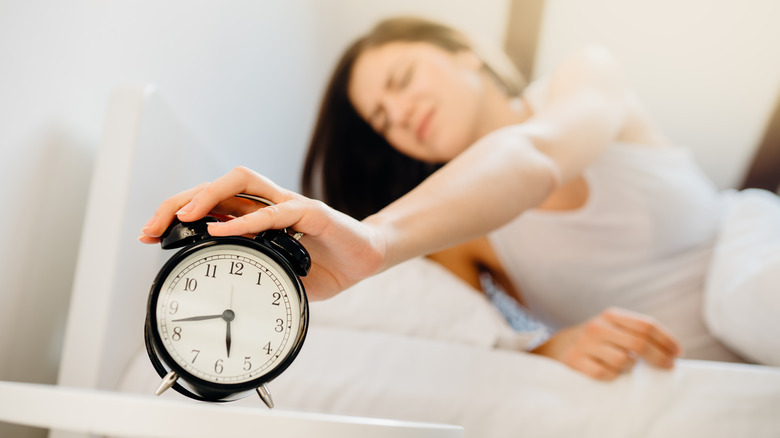Do Thyroid Issues Affect Your Sleep?
The thyroid is a gland that helps regulate your metabolism, body temperature, and heart rate. Located directly underneath the Adam's apple, the thyroid produces hormones triiodothryonine (T3) and thyroxine (T4) that greatly affect your health, explains MayoClinic. Because the thyroid controls so many important bodily functions, any issue can cause large ramifications throughout your body.
The two most common issues that happen with the thyroid involve the production of hormones. Either the thyroid will produce too many hormones, called hyperthyroidism, or more commonly, produce too few hormones, called hypothyroidism, according to Hartford Healthcare. Symptoms of thyroid disorders are fairly different for both, but can overlap. For hyperthyroidism, symptoms include weight loss, trouble sleeping, muscle weakness, and nervousness. For hypothyroidism, symptoms include fatigue, weight gain, dry skin, and forgetfulness (via Hartford Healthcare).
If you are having trouble sleeping, and noticing some of these other symptoms, you may be experiencing a thyroid issue.
Thyroid issues can affect your circadian rhythm
Thyroid issues primarily involve the gland making too much or too few specific hormones that regulate much of your body. When the hormones are unregulated, it can affect your circadian rhythm, which is your body's internal clock that controls when you fall asleep and when you wake up, according to WedMD.
Both hyperthyroidism and hypothyroidism can cause sleep issues. An overactive thyroid can make someone nervous and irritable with random bouts of tiredness which can cause trouble sleeping. It can also contribute to night sweats and excessive urination, waking you up in the middle of the night, explains the Sleep Foundation.
On the other hand, an under-active thyroid lowers someone's tolerance for cold environments and they experience muscle pain, both of which can wake them up at night (via Sleep Foundation). A 2019 study linked hypothyroidism with taking longer to fall asleep and staying asleep for shorter periods of time.


